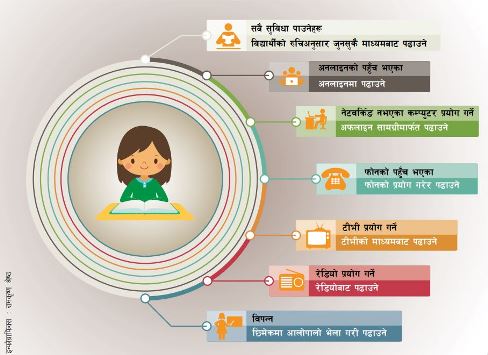
Kathmandu - This week as well there was limited news coverage on education, but an opinion article on how education system should innovate in accordance to present crisis made it in front page of Kantipur weekly. News about the mental effects of lockdown on children as a matter of growing concern among parents made it in media. Another news reported that TU has decided to postpone all the exams to be conducted from mid-April till mid-June. Australian Education minister assures support to international students Less than a week after Australian Prime Minister Scott Morison said international students who could not support their stay in the country had the option but to return.
- A letter to the editor appealed the government that the decisions on examinations be declared sooner than later. Experts suggested considering cancelation of the examination in this situation insisting, in 9-12 secondary education SEE exam in class 10 doesn’t make sense anyway. Expert suggested the government amend the law through ordinance to allow students to be examined based on previous internal exams stating example of England based A levels international board’s decision. He expressed that in such times of crisis, mental pressure to students over external exam makes no sense.
- It was reported that the education and human resource development center directed private schools to cancel all fees accept hostel fees of the previous month. It was decided in coordination with private school associations like PABSON, NPABSON and HISAN.
|
Abbreviations: MoEST- Ministry of Education, Science and Technology, KD-Kantipur Daily, THT- The Himalayan Times, SEE- Secondary Education Examination , TU- Tribhuvan University |
- An opinion article published in the front page of Kantipur discussed about how studies can continue from home. It stated that the different realities of students and their financial background can be categorized in seven different types based on which different approach for access to distance education was suggested.
He discusses that the first category is the students at the lowest economic status of the society, who do not have access to any form of communication technology. These students will need physical gathering and a teacher or volunteer to help gather in neighborhood respecting physical distancing protocols and be assisted regularly. The article discusses that the second category would be of students with access to radio. Radio based learning can be either one way where students’ answers are responded later on, or two way communication where students can interact while radio program is ongoing through other mediums of communication. The writer who is an education expert suggests that this can be possible only if teacher’s or principle’s association coordinates with radio network personals.
The third category would be students who can be taught through Television. Contents for audio visuals relevant to the curriculum are available in Midas and Kulab, or with NGOs and INGOs and also with Curriculum Development Center of the MoEST. The article suggests that coordinating with them and television stations and fundraising from different levels of government also should be led by teachers unions. He suggests community televisions venues where community can take turns in smaller groups, as a viable approach for its execution. Fourth category would be of students with access to smart phones. It is relatively easier to facilitate students in this category, as instead of creating contents from scratch, direction for students to the source of the material would also be sufficient where materials already available.
 Figure: Types of students and needed approach for access to education in Lockdown_KD_April_14_2020
Figure: Types of students and needed approach for access to education in Lockdown_KD_April_14_2020
The article states exemplary social network based lessons organized by some professors and teachers. Students’ appreciation of this medium to be more engaging and fun than usual physical gathering in classrooms was also stated in the article. It demands efforts to institutionalize these efforts by teachers and the government.
The fifth category is of students with access to computers but no internet. They will need offline digital materials which can happen with collection and distribution of already available materials through physical mediums like pen drive, hard drive, CDs and DVDs. The sixth category is of students with access to internet. Different online conference and group call apps can be used to conduct regular classes with these students by establishing protocols for participation.
The article highlights the challenges in execution of these transformative approaches. Some of them were attitudes of teachers, unprofessional characters of their unions, inability or lack of interest of leaders of all level of governments and universities to mobilize them. The attitude of the federal government bureaucrats to hold on to decision making power instead of encouraging province and local government to take action is another challenge it identified. Inability of the political leaders to make teachers responsible to their duty is another challenge.
Solutions for those who want to take the challenge was also presented. These alternatives of today will be or should be the mainstream of tomorrow’s education as the students are becoming more techno friendly and are more informed then the teachers concluded the article. Teachers should be trained to use technology or be requested to quit job to allow young teachers to take their places. Establishment of resource centers in all level of governance should be considered as well. Citizen experts, entrepreneurs and creative should be appealed for support for concepts and ideas for execution for all level of resource centers by the government instead of requesting to play national anthem. It will need reorientation of students and teachers to redefine their roles and responsibility in the new process. Access to teachers and resource persons from abroad can also be achieved. The article also calls in for reform of exam and evaluation systems accordingly. The article concludes Corona Pandemic has given the opportunity to bring innovation to the school system.
- Another news reported that materials needed for online and technology based education were being produced and organized in more than 46 countries with the support from World Bank. Some countries have developed a separate app for the purpose. Education ministry of china has reported that in collaboration with technology ministry; almost 200 million students have been participating in school education through technology. Malaysia has started a new television channel for the purpose.
'Education this Week' is a joint effort put to analyze the press coverage of education in Nepal’s selected print media published in Kathmandu. The main aim of this effort is to identify and explain major education issues picked up by the media and give back and foreground of the news. This, we believe, will help policy makers and other responsible people to keep abreast with ongoing concerns and discussions on and around education. EduKhabar, in collaboration with the Center for Educational Policies and Practices (CEPP) , has produced this analysis based on the news printed in Kantipur (Nepali) and The Himalayan Times (English), Dailies between April 8-14, 2020 (Chaitra 26, 2076- Bisakh 2, 2077) - Editor.
Read this analysis in Nepali : शैक्षिक पद्धति रुपान्तरणको अवसर
Read last week’s analysis: Learning continues online in Covid-19 Pandemic
All analysis read by this link : Education This week
प्रतिक्रिया